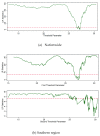Estimating the Threshold Effects of Climate on Dengue: A Case Study of Taiwan
- PMID: 32098179
- PMCID: PMC7068348
- DOI: 10.3390/ijerph17041392
Estimating the Threshold Effects of Climate on Dengue: A Case Study of Taiwan
Abstract
Climate change is regarded as one of the major factors enhancing the transmission intensity of dengue fever. In this study, we estimated the threshold effects of temperature on Aedes mosquito larval index as an early warning tool for dengue prevention. We also investigated the relationship between dengue vector index and dengue epidemics in Taiwan using weekly panel data for 17 counties from January 2012 to May 2019. To achieve our goals, we first applied the panel threshold regression technique to test for threshold effects and determine critical temperature values. Data were then further decomposed into different sets corresponding to different temperature regimes. Finally, negative binomial regression models were applied to assess the non-linear relationship between meteorological factors and Breteau index (BI). At the national level, we found that a 1°C temperature increase caused the expected value of BI to increase by 0.09 units when the temperature is less than 27.21 °C, and by 0.26 units when the temperature is greater than 27.21 °C. At the regional level, the dengue vector index was more sensitive to temperature changes because double threshold effects were found in the southern Taiwan model. For southern Taiwan, as the temperature increased by 1°C, the expected value of BI increased by 0.29, 0.63, and 1.49 units when the average temperature was less than 27.27 °C, between 27.27 and 30.17 °C, and higher than 30.17 °C, respectively. In addition, the effects of precipitation and relative humidity on BI became stronger when the average temperature exceeded the thresholds. Regarding the impacts of climate change on BI, our results showed that the potential effects on BI range from 3.5 to 54.42% under alternative temperature scenarios. By combining threshold regression techniques with count data regression models, this study provides evidence of threshold effects between climate factors and the dengue vector index. The proposed threshold of temperature could be incorporated into the implementation of public health measures and risk prediction to prevent and control dengue fever in the future.
Keywords: climate; dengue; negative binomial regression model; threshold effect; vector index.
Conflict of interest statement
The authors declare no conflict of interest.
Figures
References
-
- WHO Global Strategy for dengue prevention and control, 2012–2020. [(accessed on 2 October 2019)]; Available online: http://www.who.int/tdr/publications/documents/denguediagnosis.pdf.
MeSH terms
LinkOut - more resources
Full Text Sources
Medical


